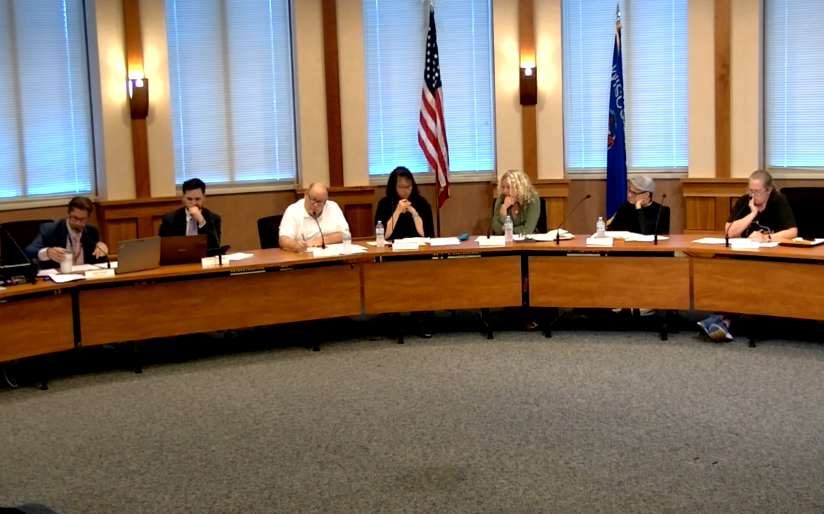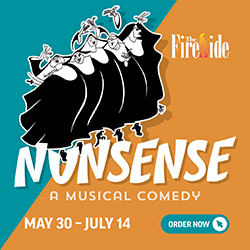Council approves updated city manager evaluation policy following protracted, contentious discussion
- Home
- Council approves updated city manager evaluation policy following protracted, contentious discussion

Council approves updated city manager evaluation policy following protracted, contentious discussion
By Kim McDarison
Members of the Whitewater Common Council Tuesday approved a city manager evaluation policy following a protracted, and sometimes contentious, discussion, which included the parsing of several legal concepts, among them: the difference between agenda items that may be discussed in closed- and open-session meetings, and the placement of items on agendas in advance of public discussion.
Addressing the council, Whitewater Human Resources Director Sara Marquardt said she was submitting for approval a draft proposal of an updated city manager evaluation policy in response to a meeting held in June, during which members of the council had offered “feedback and suggestions.”
She said the draft presented on Tuesday was meant to incorporate those concepts.
Identifying changes from a policy enacted by the city in 2020, she said the draft included an opportunity to evaluate a city manager after six months of employment, and outlined dates by which processes within the evaluation cycle were meant to occur. Further, she said, the proposed policy added the possibility of a contract amendment and offered the council the opportunity to enter into an initial closed session discussion about a city manager’s performance without the city manager present. Additionally, she said, “an annual review policy statement,” written by the city’s attorney, had been added.
Marquardt next sought to answer questions.
Council discussion
Opening the discussion, council president Jim Allen said: “I don’t want to spend too much time on this tonight, but I wanted to get it at least kicked off a little bit so we can see which direction we want to head.”
Reading a clause from within his meeting packet, he said that the policy could be changed at any time by the council and “compliance with this policy by the common council is optional.”
Councilwoman Jill Gerber asked about a provision within the draft noting that goals for a city manager would be established in July.
With regard to an evaluation of the current city manager, she said, the July deadline had already passed.
Marquardt said council members had not indicated to her in June that they wanted to establish goals for this year.
Councilwoman Brienne Brown said some goals for a city manager were established through the city’s strategic plan.
Marquardt asked council members if they were interested in setting a goal meeting for sometime this month.
“Can we do more than just setting goals for that meeting?” Allen asked.
City Attorney Jonathan McDonell, responding to Allen’s request, said: “I think we are getting a little outside of the scope of what we should be discussing here. This is supposed to be regarding the city manager annual review evaluation policy; I think we are getting a little bit too much into where our current city manager is and how this affects that person.”
Gerber asked about issues of confidentiality. She wondered how the city would maintain anonymity when city staff members offered comments as part of an evaluation process.
Marquardt said tools like Survey Monkey had been used effectively in the past.
Gerber said she was familiar with the tool, and it could be set so names of commenters were hidden, but she worried that members of the city’s relatively small staff could be identified by the types of responses they made, especially if they were department specific.
Marquardt said she would investigate the issue and follow up in the future.
Brown said the city’s Library Board used a committee process which enabled a small group of people to see the initial responses. Responses were next assembled into a summary. Language within the summary allowed its recipient to understand the “gist” of the comment, without including specific language that would aid in identifying a commenter.
Councilwoman Lisa Dawsey Smith said she believed the city’s professional human resources manager had the expertise to “extrapolate from a comment a set of proficiencies or deficiencies to be discussed amongst the body.”
“I remember somewhere in the past, and I’m talking quite a while ago, where the council just came into closed session, it was just the council, we discussed the previous year’s, goals, we made goals for the following year, and it was all done within one meeting,” Allen said.
Whitewater City Manager John Weidl said that he would have no objection if the council wanted to exclude him from an initial discussion, but, he said, “what I probably would have some umbrage with is the council meeting with no other staff to help guide them through that process.”
He said it was common practice for a city attorney to be in a meeting if the manager was asked to step out.
“I have no problem with stepping outside so you can discuss your thoughts openly and honestly, coalesce around what you believe to be important, but it needs to be guided by one of your staff professionals. So, if you want to make a change, go ahead, it’s not going to rub me the wrong way,” he said.
Allen said his proposal would be for the council to move into a closed session with the city attorney in the room. Council members could then “go over last year’s goals, make new goals, and then, the next meeting, bring the city manager in to inform him of our findings.”
Said Dawsey Smith: “My counter to that would be that in the draft of this policy is the inclusion of some sort of rubric that isn’t just a conversation that happens. It’s a holistic spectrum of the position evaluation to ensure also that the council is considering the position from all of the responsibility angles.”
Allen offered a motion made from his proposal. The motion received a second from Councilman David Stone.
Brown asked why the director of human resources was not also included as part of the proposal.
Weidl cautioned council members about the direction their conversation was taking, saying: “first of all, that’s not on the agenda. And then secondly, the discussion’s about approving or not approving the policy, and then thirdly, it’s not allowed to go into closed session to discuss the general tools for evaluating the city manager. It’s simply not one of the six reasons the council can go into closed session.”
Allen, admitting he was confused, asked Weidl to restate his concerns.
Said Weidl: “To discuss the goals and performance tool of the city manager is an open session conversation. To evaluate the performance of the current employee is a closed session conversation. This topic on the agenda is whether or not to approve or not approve the policy. That’s where we’re at.”
Allen restated his earlier comment that the policy could be changed at any time, and, he said, “we don’t have to follow it. He cited “Section 4, Paragraph 1.”
Weidl questioned Allen’s understanding of the policy clause he was reading. He agreed that the policy could be changed.
Addressing Allen, he said: “I don’t know where you are headed with this.”
Allen responded, saying: “Well, what I want to do is, Jonathan, you can help me here, go into closed session at our next meeting to do an evaluation of the city manager, his past performance and set goals for next year, and at the future meeting, bring the city manager position in to go over that. However you want to word that to make it happen, let’s do it.”
“That would be inconsistent with the existing policy that’s already on record,” Dawsey Smith said.
“We are getting rid of the policy,” Allen responded.
Said McDonell: “Well the policy that is currently in effect is what is going to dictate.”
Referencing the proposed draft, he said: “This hasn’t been passed, so this is not in effect yet.”
He asked: “Are you suggesting that you make an amendment to this policy or are you asking for a closed session item on the next meeting to discuss the city manager’s performance …
Allen said he wanted “all of the above.”
Stone asked if the problem was that setting goals should not be a part of a closed session meeting.
Addressing Weidl, Allen asked: “Is that where you are stuck, John, goals?”
“I’m stuck on we don’t seem to be following the actual approved policy which is in your packet on page 64 with an issue date of 01/07/2020. That’s what’s like currently approved and exists … I’m not trying to be obstinate; I firmly believe the council should do the evaluation, I would suggest in absence of changing the policy, you probably have to follow the policy that’s on page 64 (of the meeting packet). And what Sara’s proposing is you change it to the policy she’s proposing on page 48 and 49 (of the packet), and it seems like there’s been some changes that I think everyone can agree to approve proposed by the council since, including removing the city manager from the first formal closed session and making it city attorney and a few others, that’s my general understanding of what’s happening. But in the absence of a new policy, the policy as it exists starts on page 64.”
McDonell concurred with Weidl that discussions beyond those of policy would need to be brought forward on a future agenda.
Said Gerber: “Not to throw this whole thing off track, but since it was in the packet, the competency questions, I did have some changes that I wanted to make there, additions, clearly we can’t discuss that now because we are only talking about the policy, so is this an open session item?”
Weidl said it was, adding that anything about the “tool” used to evaluate a city manager would need to be discussed in open session.
Brown moved to approve the policy as proposed by Marquardt. Her motion received a second from Dawsey Smith.
Weidl said that evaluation policies, such as the one appearing before council, are often structured such that a city manager is not in the first evaluation meeting.
“Council members need to talk,” he said, adding that he “strongly suggested” they include in that first meeting a city attorney.
Brown amended her motion to include a city attorney in an initial city manager evaluation meeting that did not include the city manager.
Allen said his earlier motion, which had been seconded by Stone, remained on the table.
“The city attorney told you that that was not a motion that was eligible under this,” Dawsey Smith said.
Council members and the city clerk had difficultly recalling the motion.
Allen said his motion was to amend the proposed policy developed by Marquardt to allow council to move into a closed session to evaluate the performance of the city manager for the last year.
McDonell responded, saying: “No, that’s kind of beyond the scope of what we are trying to do here. That sounds more like a specific agenda item for the future to discuss the city manager’s performance in a closed session.”
“Well, that’s what we need to get to,” Allen said.
“Put it on the agenda for the future,” McDonell said.
Taking up Brown’s motion, Allen asked if that could be adopted.
Weidl said it could as it was a motion meant to amend the policy.
Allen reiterated his desire to “get rid of the old policy.”
Said Dawsey Smith: “If this policy is adopted it will supersede that policy because it is an amendment to that policy.”
Allen asked: “Does that mean the old policy is no longer valid then?”
Weidl noted that he was correct.
“Ok, but approving this is not moving us forward. That’s my point,” Allen said.
Dawsey Smith noted that if the council approved the draft proposal, Allen could request a future agenda item that would allow council to consider approving a “six-month check-in” evaluation of the city manager, which, under the new policy, would have been performed in July.
Brown restated her motion to include a city attorney or human resources director in a city manager evaluation closed session meeting when the city manager is excluded from an initial closed session evaluation meeting.
Said Allen: “Since our current city attorney is feeling some pressure from the org. chart, would it be alright if we went out and sought outside council?”
“Who’s feeling pressure?” Weidl asked. He said he did not understand Allen’s comment.
“Your org. chart says that city — and you told us that the city attorney works for you, not us,” Allen said.
Weidl asked: “Who said that to you ever?”
Allen responded: “You did. It’s clearly evident in the org. chart you put out last week.”
Weidl said the chart to which Allen was referring was developed by human resources, and he said, “that was vetted and we had opportunity to talk about it. If you are expressing a concern that I’m somehow going to lean on the city attorney so you guys can’t appropriately express your concerns, I’m not seeing that.”
Allen said he believed “there was some discomfort” on the part of the city attorney. He said: “I think Jon has discomfort discussing this item one-on-one with me because he works for you.”
Said Weidl: “No, it’s because it’s not allowed. You’re the council president which makes you one among equals responsible for running meetings. That’s why he’s not discussing it with you.”
“Well then he can discuss it with the whole board,” Allen said.
Weidl agreed, noting that a discussion about his performance would be an appropriate closed session exemption.
“Let’s change the org. chart then because that was a point that needed to be clarified two weeks ago. It’s a point of contention that John clearly said that … the city attorney works for the city manager,” Allen said.
He next addressed his fellow council members, asking: “Did you all not hear that? Did anybody else hear that? Did you not see it on the org. chart?”
In response, Dawsey Smith said: “I would say that the org. chart is consistent with state statute. I am not sure where a discrepancy would be. I would also trust that someone who has done what is necessary to be an attorney is capable of maintaining the law when it comes to closed session confidentiality.”
“I have full faith in Jon (McDonell),” Allen said.
Council members next revisited Brown’s motion.
Gerber asked for an amendment to the motion removing the word “complete” from language referencing the delivery of anonymity to those who might comment during a city manager’s evaluation.
“I don’t really think we can honor ‘complete,’” Gerber said.
The motion, with Gerber’s amendment, was approved by a vote of 5-1, with Allen casting the ‘no’ vote. Councilman Lukas Schreiber was not in attendance.
Also during Tuesday’s meeting, Gerber asked that a discussion about competency questions associated with the city manager’s evaluation be added to an upcoming agenda.

Whitewater City Manager John Weidl, from left, city attorney Jonathan McDonell, Whitewater Common Council President Jim Allen, and council members Jill Gerber, Brienne Brown, David Stone and Lisa Dawsey Smith assemble Tuesday. Not pictured are council members Neil Hicks, who was in attendance virtually, and Lukas Schreiber, who was not in attendance. The Whitewater Common Council discussed changes to a city manager evaluation policy. Discussion became confused as council members conflated topics associated with general policy decisions and specifics concerning an evaluation of the current city manager. Screen shot photo.
This post has already been read 1456 times!
Kim
Our Advertisers
Most Read Posts
- Our Take: If secrecy is embraced, transparency is disabled

- Eight finalists make the cut in Whitewater WindUp competition; winner to be chosen May 18

- DOT: Two-phased improvement project slated for highways 11 and 12 in Walworth County

- Roundtable presenter shares affordable housing designs, cost-reducing construction options

- Commentary: Remembering journalist Sam Martino

- DOT: Department revokes three Elkhorn wholesale dealers' licenses

- BaristaCats Cafe takes first place in Whitewater WindUp competition

- UW-Whitewater May 2024 graduates receive degrees

- Food drive to support local pantries to be held Saturday

- CDA recommends approval of 128-unit multifamily development on Moraine View Parkway

Categories
- Advertisers
- Area events
- Art, culture
- Business
- Community
- County
- Crime, court
- Culture
- Diseases
- Economics
- Food
- Government
- International
- Law and Court
- Lifestyle
- Obituaries
- Opinion
- Police, fire, EMS
- Religion
- School
- Science
- Technology
- Today's features
- Today's news
- Top Stories
- Travel
- Uncategorized
- University
- World












